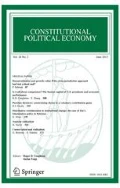Abstract
In 1964 James Buchanan famously asked “What Should Economists Do?” He argued that economists should focus their intellectual attention on exchange and the institutions within which exchange takes place. This paper reflects on Buchanan’s message and looks at the development of that argument, and its implications in the wake of post-socialist political economy on the one hand, and the post-financial crisis of 2008 on the other. Following Buchanan, the paper argues that classical liberal political economists must embrace the intellectual and practical challenges of the day, and bring a robust theory of political economy to bear on questions of justice, questions of freedom and responsibility, and questions concerning the invisible hand and the appropriate institutional framework which results in peaceful social cooperation and productive specialization in a society of free and responsible individuals.
Similar content being viewed by others
References
Buchanan, J. M. (1949). The pure theory of government finance: A suggested approach. Journal of Political Economy, 57(6), 496–505.
Buchanan, J. M. (1959). Positive economics, welfare economics, and political economy. Journal of Law and Economics, 2, 124–138.
Buchanan, J. M. (1964). What should economists do? Southern Economic Journal, 30(3), 213–222.
Buchanan, J. M. (1965). Ethical rules, expected values, and large numbers. Ethics, 76(1), 1–13.
Buchanan, J. M. (1979). Politics without Romance: A sketch of positive public choice theory and its normative implications. Inaugural lecture, Institute for Advanced Studies, Vienna, Austria. IHS Journal, Zeitschrift des Instituts für Höhere Studien, 3, B1–B11.
Buchanan, J. M. (2005). Why I, too, am not a conservative the normative vision of classical liberalism. Cheltenham, UK: Edward Elgar Publishers.
Buchanan, J. M. ([1968] 1999b). The demand and supply of public goods, vol. 5 of the collected works of James M. Buchanan. Indianapolis, Ind.: Liberty Fund.
Buchanan, J. M. ([1975] 2000). The limits of liberty: Between anarchy and leviathan, vol. 7 of the collected works of James M. Buchanan. Indianapolis, Ind.: Liberty Fund.
Buchanan, J. M., & Tullock, G. ([1962] 1999). The calculus of consent: Logical foundations of constitutional democracy, vol. 3 of the collected works of James M. Buchanan. Indianapolis, Ind.: Liberty Fund.
Knight, F. (1960). Intelligence and democratic action. Cambridge: Harvard University Press.
Leeson, P. (2010). Anarchy unbound: How much order can spontaneous order create? In P. J. Boettke (Ed.), The handbook of contemporary Austrian economics (pp. 136–153). Cheltenham, UK: Edward Elgar Publishing.
Ostrom, E. (1990). Governing the commons: The evolution of institutions for collective action. Cambridge: Cambridge University Press.
Rajan, R. (2004). Assume anarchy? Finance and Development, 41(3), 56–57.
Author information
Authors and Affiliations
Corresponding author
Rights and permissions
About this article
Cite this article
Boettke, P.J. What should classical liberal political economists do?. Const Polit Econ 25, 110–124 (2014). https://doi.org/10.1007/s10602-014-9155-1
Published:
Issue Date:
DOI: https://doi.org/10.1007/s10602-014-9155-1
Keywords
- James Buchanan
- Methodological individualism
- Spontaneous order
- Institutional economics
- Constitutional political economy




